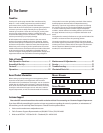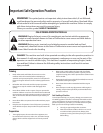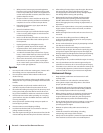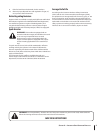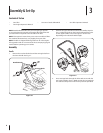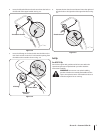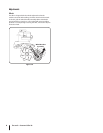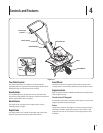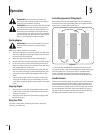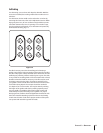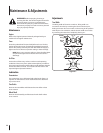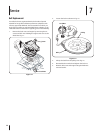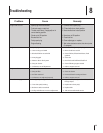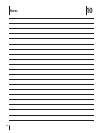
WARNING! Read, understand, and follow all
instructions and warnings posted on the machine
and in this manual before operating.
WARNING! Be sure no one other than the operator
is standing near the tiller while starting engine or
operating the unit. Never run engine indoors or in
enclosed, poorly ventilated areas. Engine exhaust
contains carbon monoxide, an odorless and deadly
gas. Keep hands, feet, hair and loose clothing away
from any moving parts on engine and tiller.
Starting Engine
WARNING! Be sure no one is standing in front of
the tiller while the engine is running or being
started.
Refer to the engine manual for instructions.
Attach spark plug wire to spark plug. Make sure the metal
cap on the end of the spark plug is fastened securely over
the metal tip on the spark plug.
Make sure that the tine clutch control is disengaged.
Place the throttle control (if equipped) in the FAST position.
For first time start-up, firmly press engine primer five (5)
times. For all future starts, press three (3) times. Wait about
two seconds between each press.
Place left hand on gas tank. Grasp recoil starter and pull
rope out slowly until engine reaches the beginning of its
compression cycle (rope will pull slightly harder at this
point).
Pull rope with a rapid, continuous, full arm stroke. Keep
a firm grip on handle. Let rope rewind slowly. Do not let
recoil starter snap back against engine. Repeat until engine
starts.
Stopping Engine
Move throttle control lever (if equipped) to STOP or OFF
position. Refer to the engine manual for instructions on
stopping the engine.
Disconnect spark plug wire from spark plug and ground
against the engine.
Using Your Tiller
Your tiller is designed for seed bed preparation, cultivating,
furrowing, and mulching.
1.
2.
3.
4.
5.
6.
1.
2.
Controlling Speed and Tilling Depth
When tilling, leave approximately eight inches of untilled soil
between the first and second tilling paths, then make the third
path between the first and second, Fig. 5-1.
In some soils, the desired depth is obtained the first time over
the garden. In other soils, the desired depth is obtained by going
over the garden two or three times. Passes should be made
across the length and width of the garden alternately. Rocks
which are turned up should be removed from the garden area.
Handle Pressure
Further control of tilling depth and travel speed can be obtained
by variation of pressure on the handles. A downward pressure
on the handles will reduce the working depth and increase the
forward speed. An upward pressure on the handles will increase
the working depth and reduce the forward speed. The type of
soil and working conditions will determine the actual setting of
the depth stake and the handle pressure required.
54 32
1
Figure 5-1
Operation
5
10



